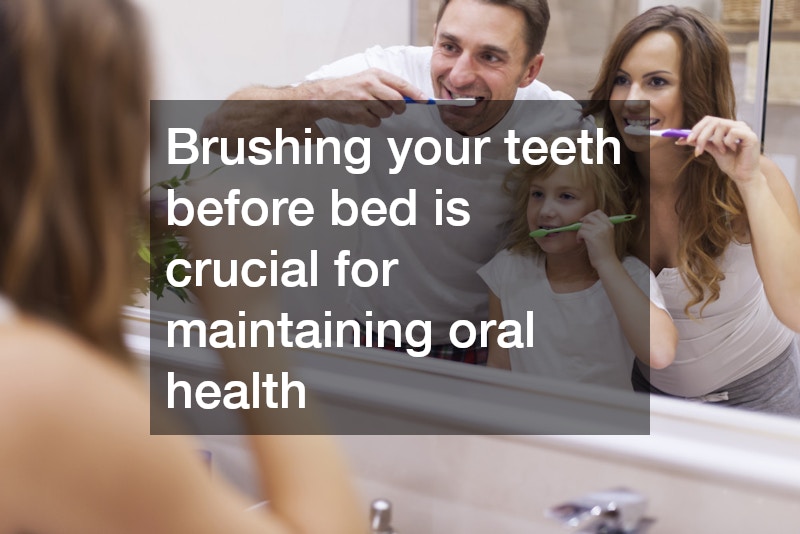Learn the fundamental reasons why brushing your teeth before bed is crucial for maintaining oral health. This practice is more than just a nightly routine—it plays a significant role in preventing dental issues, ensuring fresh breath, and promoting overall health and allows your visit to the dentist to go more smoothly.
Why Is Brushing Your Teeth Before Bed So Important?
Brushing your teeth before bed removes plaque and food particles that accumulate throughout the day. As we consume various types of food and beverages, our teeth become exposed to sugars and acids that can erode enamel if not cleaned properly.
Nighttime brushing helps eliminate these substances, reducing the risk of plaque formation. Plaque is a sticky film of bacteria that, if not removed, can harden into tartar and lead to cavities and gum disease. Thus, evening brushing acts as a defense mechanism, helping to protect your teeth from decay and supporting long-term dental health.
Another significant benefit of brushing at night is the prevention of cavities. The process of demineralization—where acids dissolve tooth enamel—can occur if food particles remain in the mouth overnight. By brushing regularly before sleep, you ensure that your teeth are clean and protected against acid attacks, which are often exacerbated by the reduced saliva production while sleeping. Saliva plays a crucial role in neutralizing acids and aiding in the remineralization process. Therefore, it’s essential to minimize the risk to your enamel and dental health by maintaining a strict pre-bedtime oral hygiene routine.
Oral hygiene during sleep is critical, as the mouth becomes a breeding ground for bacteria when it is inactive. Brushing removes these bacteria, which are responsible for bad breath and potential oral infections. Regular cleaning of the teeth and gums ensures a healthy environment, reducing the chances of halitosis and periodontal disease. Moreover, brushing at night ensures that you wake up with fresher breath, contributing to a more comfortable morning routine and improved interpersonal interactions.
What Happens if You Skip Brushing Before Bed?
Neglecting to brush your teeth before heading to bed can lead to various dental problems. When plaque is not removed effectively, it can start to harden into tartar, which is significantly harder to remove and requires professional cleaning. This buildup can result in tooth decay and cavities, compromising the structural integrity of your teeth. When bacteria feed on the sugars stuck on your teeth overnight, they produce acids that erode the enamel, eventually reaching the softer layers beneath. This can lead to increased sensitivity, pain, and the need for more extensive dental treatments.
Another consequence of skipping nighttime brushing is the heightened risk of gum disease. The bacteria present in plaque can irritate and inflame the gums, a condition known as gingivitis. Without proper oral hygiene, this inflammation can progress to periodontitis, a serious gum infection that damages the soft tissue and can destroy the bone supporting your teeth. This condition may lead to tooth loss and has been linked with systemic health issues, including cardiovascular disease and diabetes. By ensuring that brushing is an integral part of your nightly routine, you can significantly reduce the risk of both oral and systemic health complications.
Moreover, the failure to brush before bed often results in bad breath, or halitosis, which can be embarrassing and socially isolating. Overnight, bacteria thrive in the mouth, producing volatile sulfur compounds that contribute to unpleasant odors. Practicing good oral hygiene by brushing before sleeping will help maintain fresh breath, boost your confidence, and improve your quality of life. Consistent care is crucial for maintaining oral hygiene and ensuring that you wake up with a clean mouth and healthy teeth.
How Can You Incorporate Effective Brushing Habits Into Your Bedtime Routine?
Establishing a consistent bedtime brushing routine requires a combination of technique, tools, and commitment. Choosing a toothbrush with soft bristles ensures a gentle yet effective cleaning, while fluoride toothpaste offers protection against decay and strengthens enamel. Set a timer for two minutes to ensure that all surfaces of your teeth are addressed, using gentle, circular motions. Paying attention to the gum line and hard-to-reach areas will help remove plaque efficiently. Making brushing a non-negotiable part of your nightly routine, regardless of the day’s challenges, is vital for maintaining excellent oral health.
Incorporating technology or reminders can aid in forming a consistent habit. Electric toothbrushes with built-in timers and pressure sensors can enhance brushing effectiveness while ensuring proper technique. Alternatively, consider setting a daily alarm on your phone or using apps designed to track oral hygiene habits. By committing to a fixed schedule, brushing becomes a natural part of winding down and relaxing the mind, transitioning you toward restful sleep. In particular, brushing your teeth before bed helps to remove debris, bacteria, and plaque from the entire day, setting a strong foundation for oral care.
Additionally, adopting a holistic approach to dental care at night can enhance overall effectiveness. Complement brushing with activities such as flossing and using mouthwash. Flossing removes food particles trapped between teeth that a toothbrush cannot reach, preventing plaque buildup and gum disease. A therapeutic mouthwash can help reduce bacteria and provide additional fluoride protection, leaving your mouth feeling fresh. By integrating these practices into your nighttime routine, you create a comprehensive oral care regimen that enhances hygiene, prevents dental problems, and supports long-term health.




